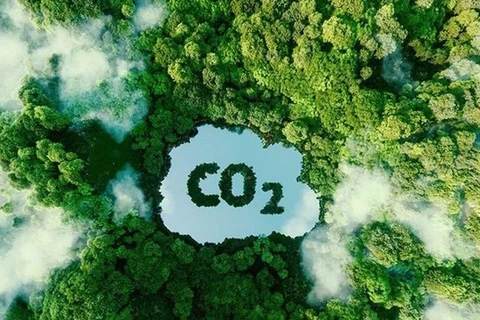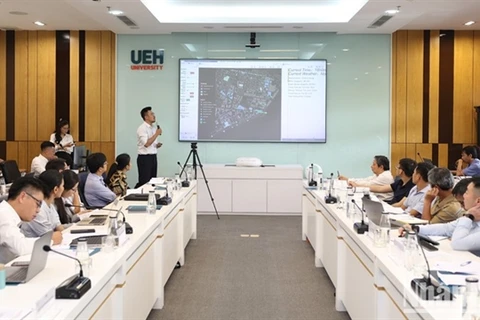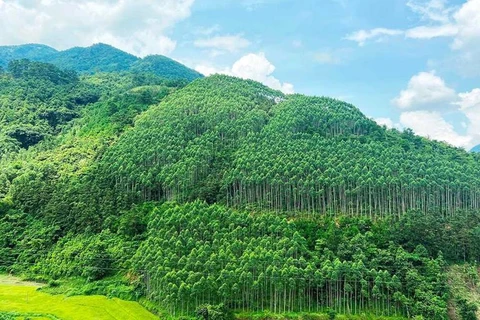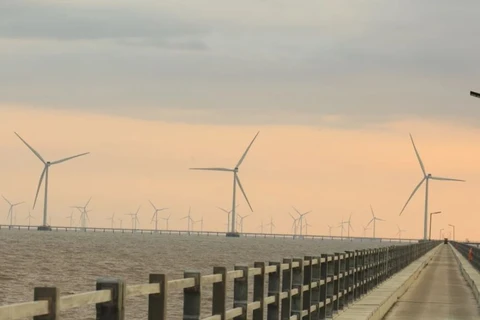HCM City (VNA) – Vietnam's wood industry has opportunities to engage in the carbon market as the whole world is pushing ahead for a greener economy, heard a recent dialogue in Ho Chi Minh City.
Speaking at the Green Finance for Wood and Furniture Industry dialogue on the sidelines of HawaExpo, deputy chairman of the Handicraft and Wood Industry Association of HCM City Phung Quoc Man stressed that reducing carbon emissions has become a requirement for manufacturing industries so as to deliver on the net-zero target.
The Government has issued a series of specific action programmes, including a roadmap to develop the carbon credit market until 2028 with the active participation of enterprises, he said, adding the European Union has applied the Carbon Border Adjustment Mechanism (CBAM) since October 1, 2023, which could affect Vietnam’s exports.
He went on to say that while many other manufacturing industries consider reducing emissions as a challenge, the wood industry sees it as an opportunity since it possesses large planted forests where carbon credits are created.
“If we know how to effectively capitalise on carbon credits, the wood industry will not only contribute to the net-zero goal but also increase economic efficiency from green finance for forest growers.”
Meanwhile, Assoc.Prof.Dr. Nguyen Dinh Tho, Director of the Institute of Strategy and Policy on Natural Resources and Environment, said being one of the world’s largest wood and forestry producing countries, Vietnam has policies for developing the forestry industry in a sustainable manner, including green finance and the carbon market, which would help minimise the impacts of climate change and address environmental challenges.
Statistics from the World Bank showed that several international organisations, through the REDD+ mechanism, have paid local administrations and countries for their verified efforts to reduce deforestation and recover forests.
The market for carbon offsets in 2023 was some 2 billion USD, and the figure is forecast to reach 20 billion USD by 2030.
Director of the Vietnam Forest Certification Office Vu Tan Phuong said 2023 marked a significant milestone for the forestry sector with Vietnam signing agreements to sell 10.3 million forest carbon credits (10.3 million tonnes of CO2) for the first time through the World Bank for 51.5 million USD.
The country received the first payment of 41.2 million USD last year and handed it to six north-central provinces of Nghe An, Quang Binh, Thanh Hoa, Ha Tinh, Thua Thien – Hue and Quang Tri to make payments to forest owners.
Director of VinaCarbon Climate Impact Fund Nguyen Ngoc Tung highlighted the wood industry’s huge potential to create carbon credits, given that the longer a tree's lifespan, the more revenues a company could get from carbon credits.
Vietnam has more than 14 million hectares of forests, half of which are production forests, he said, adding if timber businesses are aware of the inevitability of sustainable development and emission reduction, their earning will come from not only production but also carbon credits.
Other experts said reducing emissions requires the wood industry to comply with international regulations on sustainable forest management and exploitation, which would also increase their competitiveness and ability to penetrate large markets.
 Businesses must integrate environmental, social and government (ESG) practices into their operations. (Photo: VNA)
Businesses must integrate environmental, social and government (ESG) practices into their operations. (Photo: VNA) But to create carbon credits, businesses must integrate environmental, social and government (ESG) practices into their operations and report greenhouse gas emissions, they said.
There are obstacles that make investors hoping to invest in Vietnam’s forest carbon credits cautious, while there are no specific instructions on how to collect and sell carbon credits, they pointed out.
For businesses to participate in sustainable forest management, certified materials mechanisms and policies need to be improved, they said.
They need to focus on financial and investment incentives for businesses adopting green production and making goods that do not cause deforestation, promote consumption of certified timber and wood products, and ensure fairness in the production and consumption of certified timber and wood products, they underscored.
It is also necessary to support capacity building by stakeholders implementing sustainable forest management and greenhouse gas emission reduction activities, they added./.
























